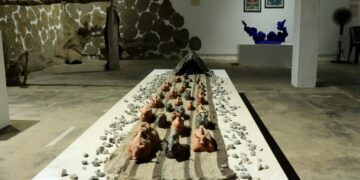Great human beings take birth to embrace death, but blessed are those who, in life’s limited time, reveal their hidden talents in such a way that they leave indelible prints, everlasting in the memories of generations to come. Today, we glorify the man whom the Almighty endowed with immense talent — G. M. Bhat Sahib — a born artist and instrumentalist, gifted with a melodious voice and a magical Tumbakhnari style that enchanted audiences. He came to be regarded as a towering figure in the field of art and music.
Born in a middle-class family at Malaknag, Anantnag, in 1925, young Bhat was drawn to music from his teenage years under the patronage of his Peer-u-Murshid. At that time, the state was under the Dogra regime and Muslims had little access to education. As a result, he adopted Gabasazi as a profession. Yet, even while working at a Gabasazi unit in Kadipora, he hummed Kashmiri Sufi songs with such devotion and sweetness that passersby were spellbound, gathering to listen.
Those were the years when Kashmiris were struggling for freedom from Dogra rule. Bhat Sahib did not remain silent; rather, he infused zeal into both youth and elders by singing patriotic and freedom songs on public stages. His voice became a source of inspiration that drove people towards their goal. For this, he was imprisoned for six months in Central Jail, Srinagar.
When freedom was finally achieved, it was resolved that those who had contributed to the struggle would be honoured. As both a freedom fighter and a naturally gifted artist, Bhat Sahib drew admiration from the then Deputy Prime Minister Bakshi Ghulam Mohammad, who praised his talent and contribution. In recognition, he was appointed an artist at Radio Jammu in 1947, since Radio Kashmir Srinagar was still under construction. With its completion in July 1948, Bhat Sahib found his rightful place as one of the founding artists of Radio Kashmir Srinagar.
Without any formal training — for such institutions did not exist at the time — Bhat Sahib pioneered new life and style in Kashmiri folk traditions, especially Chakri and Rouf. He was the first to set Kashmiri fables and tales to music, bringing works such as Yousuf Nama, Aknandun, Heemal Nagrai and Zinmazor to the airwaves. These performances were cherished by listeners across the Valley. Along with the late Ali Mohammad Rah, he also introduced Kashmiri ghazal singing at Radio Srinagar. He sang solos, duets, and choruses, collaborating with many artists. Among his most beloved songs were Madhno gazs chaini maya, Islambadich Roni Kangaria, Gulab Panas Kala rang goam, and Mardan heizah watai na mard wepch no tateh, which left a lasting imprint on Kashmiri hearts.
A milestone in his career came when he played his Tumbakhnari in a Kashmiri song rendered by India’s celebrated playback singer Asha Bhosle. In those days, when few households owned radio sets, the government installed one with a loudspeaker in Sharbagh Park, Anantnag. People would eagerly gather there, waiting to hear Bhat Sahib’s melodious voice ripple across the air, echoing through every corner of Kashmir.
The Tumbakhnari became his signature. No one has since equaled his mastery of this instrument, for he was its pioneer and true master. Even today, his Tumbakhnari resonates in the signature tune of Radio Kashmir Srinagar. His artistry was not confined to Kashmir alone; it was acclaimed nationally and internationally. He represented Kashmir on cultural delegations across India, winning medals and certificates for his contributions.
In 1985, he travelled with his troupe to Japan, where they presented Kashmiri art and song. The reception was extraordinary — audiences and authorities alike were enthralled. His Tumbakhnari, played with magical dexterity, was so admired that it was placed in a Japanese Art Museum as a treasured gift. Such was the recognition of his divine gift, the blessings of his Murshid, and his tireless dedication.
For nearly four decades, Bhat Sahib shone brightly on the musical horizon. His service to Kashmiri music earned him many honours during his career. He retired from Radio Kashmir Srinagar in December 1985. On 20th May 2006, his earthly journey ended, leaving behind a great void. Though the music ceased, the voice lives on in memory, cherished forever.
Beyond his art, Bhat Sahib was also a noble human being — a devoted husband, a responsible father, and a social figure with a deeply spiritual bent. His heartfelt Azan of “Allahu Akbar” once echoed across horizons, and his soulful Naat Khawani continues to touch every heart that remembers him.
Artists, writers, and visionaries who contribute to culture are the assets of a nation. It is the moral, ethical, and social responsibility of society in general, and institutions in particular, to honour such figures so that future generations may remain connected to their rich heritage. Bodies such as the Cultural Academy, Radio, TV, and the media must perform this duty with sincerity — not as a formality, but for the sake of art itself. The Cultural Academy should ensure that the warmth of our departed artists and writers continues to be felt by the generations yet to come.






